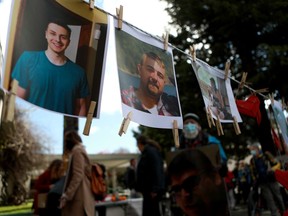Decriminalization comes after a federal exemption from Canada's drug laws to allow substance users to possess a total of 2.5 grams of opioids such as heroin and fentanyl, as well as crack and powder cocaine, methamphetamine and MDMA.

The B.C. government says its plan to decriminalize small amounts of drugs for personal use includes hiring staff in health authorities to connect people with services in their community.
It says even though police will no longer be arresting people and seizing their drugs, officers will hand out resource cards when they happen to interact with substance users so they can voluntarily access social and health services.
Start your day with a roundup of B.C.-focused news and opinion delivered straight to your inbox at 7 a.m., Monday to Friday.
Thanks for signing up!
A welcome email is on its way. If you don't see it, please check your junk folder.
The next issue of Sunrise presented by Vancouver Sun will soon be in your inbox.
Decriminalization comes Tuesday after a federal exemption from Canada’s drug laws to allow substance users to possess a total of 2.5 grams of opioids such as heroin and fentanyl, as well as crack and powder cocaine, methamphetamine and MDMA, also known as ecstasy.
Over 11,000 people have fatally overdosed in B.C. from toxic street drugs since the province declared a public health emergency in 2016, and decriminalization is aimed at reducing stigma, which prevents people from accessing services.
The province says decriminalization is just one tool in the fight against the overdose crisis and it has worked with the RCMP and municipal police departments to develop training and guidance that is available to about 9,000 officers.
Decriminalization applies to substance users over age 18 but the plan is being criticized for not including youth.
You can watch the press conference live here:
More to come …
-

5 things to know about B.C. decriminalizing possession of drugs for personal use
-

Fraser Health leads as B.C. overdose calls drop slightly
-

Tracking overdose deaths in B.C.: Who's dying and what's killing them
-

Measuring success: There's no agreement on how to decide whether drug decriminalization works


